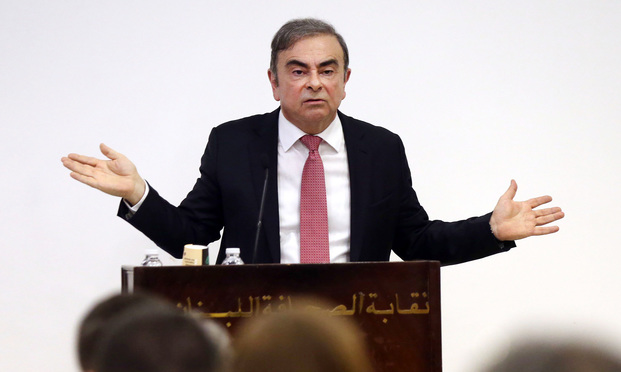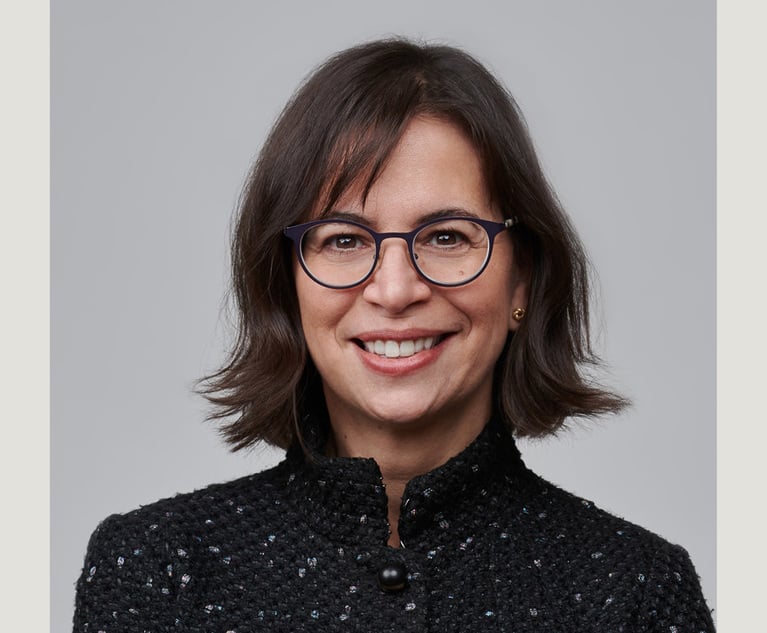Daily Dicta: When Your Client Jumps Bail and Escapes to Lebanon in a Box—and You're Stuck Defending a Securities Suit (Paul Weiss Edition)
Plaintiffs lawyers from Robbins Geller Rudman & Dowd are leveraging their newfound advantage after Ghosn in December escaped from Japan, where he faces criminal charges of financial misconduct.
February 13, 2020 at 01:09 AM
5 minute read
 Carlos Ghosn, former chief executive officer of Nissan Motor Co. and Renault SA, gestures as he speaks to the media at the Lebanese Press Syndicate in Beirut, Lebanon, on Wednesday, Jan. 8, 2020. "Ripped from my family, my friends, my communities, from Renault, Nissan and Mitsubishi and the 450,000 women and men who comprise those companies. It is impossible to express the depth of that deprivation and my profound appreciation to once again be able to be reunited with my family and loved ones," Ghosn said. Photographer: Hasan Shaaban/Bloomberg
Carlos Ghosn, former chief executive officer of Nissan Motor Co. and Renault SA, gestures as he speaks to the media at the Lebanese Press Syndicate in Beirut, Lebanon, on Wednesday, Jan. 8, 2020. "Ripped from my family, my friends, my communities, from Renault, Nissan and Mitsubishi and the 450,000 women and men who comprise those companies. It is impossible to express the depth of that deprivation and my profound appreciation to once again be able to be reunited with my family and loved ones," Ghosn said. Photographer: Hasan Shaaban/Bloomberg
For a while, it seemed like Paul Weiss lawyers had a strong argument that all claims in a securities fraud class action against their client Carlos Ghosn should be dismissed—that the federal court in Nashville lacked personal jurisdiction over the ex-Nissan chairman.
"Subjecting a foreigner to suit in the United States is burdensome under ordinary circumstances, but here the burdens are much higher since Mr. Ghosn at present cannot even leave Japan by order of the Japanese authorities, is subject to constant surveillance, and is barred from interacting with witnesses in his case (among other limitations)," wrote Paul Weiss securities litigation co-chair Audra Soloway in August, back when all of that was true.
But there's nothing like your client jumping bail and fleeing to Lebanon stuffed in a big black box on an illegally chartered business jet to derail your best-laid jurisdiction and forum non conveniens arguments.
 (Man, I hate it when that happens.)
(Man, I hate it when that happens.)
Plaintiffs lawyers from Robbins Geller Rudman & Dowd are leveraging their newfound advantage after Ghosn in December escaped from Japan, where he faces criminal charges of financial misconduct.
In court papers filed Tuesday, the plaintiffs lawyers argued that with Ghosn "on the lam, the circumstances he has so heavily relied upon no longer exist."
That is, Ghosn 1) is no longer in Japan 2) isn't subject to constant surveillance by Japanese authorities and 3) can interact with witnesses in his case as he sees fit.
"By absconding, Ghosn has successfully freed himself of every restriction he had complained of," wrote Robbins Geller partner Christopher Wood.
Bonus for Ghosn: Lebanon doesn't have an extradition treaty with Japan, and Lebanese law precludes the extradition of its own citizens.
True, Ghosn is now subject to a temporary travel ban by Lebanon, but Wood argues that's hardly equivalent to awaiting a lengthy criminal trial in Japan.
"Ghosn now casually attempts to substitute the burden arguments above, suggesting that it is now the temporary travel ban by Lebanon that would make the court's exercise of personal jurisdiction unreasonable," Wood wrote. "Ignoring, for a moment, Ghosn's pattern of deception with this court and his stated willingness 'to stand trial anywhere where I think I can have a fair trial,' that is preposterous."
Ghosn didn't help his cause at a press conference in Beirut, where he told reporters "I don't consider myself as a prisoner in Lebanon… I am with my family. My kids can come visit me. I can use the phone and the internet. I don't have 'followers' (keeping an eye on me)."
"In other words," the Robbins Geller lawyers wrote, "Ghosn has no restrictions on his ability to communicate, no surveillance by the state, and therefore no meaningful burden on his ability to defend himself in this action."
Also, they argued, even if Ghosn couldn't leave Lebanon, that wouldn't preclude federal discovery, including a deposition. Ghosn himself opened this door when he told the reporters, "There are many other documents I can provide. … If you contact my lawyers, they can show you the documents."
Wood wrote, "Ghosn's willingness to disclose probative materials when it suits him further demonstrates that he is fully capable of doing so in this action."
Robbins Geller sued defendants including Ghosn and Nissan (represented by Latham & Watkins) in December of 2018 on behalf of the Jackson County Employees' Retirement System and other purchasers of Nissan American Depositary Receipts ("ADRs") between December 10, 2013 and November 16, 2018.
Nissan's U.S. headquarters is located in Smyrna, Tennessee—hence the Middle District of Tennessee venue. The suit alleges that unbeknownst to investors, Nissan "has been materially understating its expenses—and overstating profits—by concealing half of the annual executive compensation" that it paid to Ghosn.
"In truth and in fact, Nissan paid defendant Ghosn an additional ¥1 billion per year in the form of deferred compensation I.O.U.'s, but failed to disclose these payments in the company's publicly filed financial reports," the complaint states.
(¥1 billion is about $9 million, but that doesn't sound nearly as impressive.)
"Not only did the underreporting deceive Nissan's investors, it violated the pay cap Nissan shareholders approved, and so Nissan ordinary shares are now under threat of being delisted," according to the complaint.
That sounds solid enough. But a key threshold question remains: Does the court in Tennessee have jurisdiction?
Escaping to Lebanon may have solved some of Ghosn's problems, but not this one.
A Paul Weiss spokesman did not respond to a request for comment. The suit remains pending before U.S. District Judge William L. Campbell, Jr.
This content has been archived. It is available through our partners, LexisNexis® and Bloomberg Law.
To view this content, please continue to their sites.
Not a Lexis Subscriber?
Subscribe Now
Not a Bloomberg Law Subscriber?
Subscribe Now
NOT FOR REPRINT
© 2025 ALM Global, LLC, All Rights Reserved. Request academic re-use from www.copyright.com. All other uses, submit a request to [email protected]. For more information visit Asset & Logo Licensing.
You Might Like
View All
Litigators of the Week: The Eighth Circuit Knocks Out a $564M Verdict Against BMO in Ponzi Case

Litigators of the Week: Second Circuit Tells Argentina to Turn Over More Than $300M to Bondholders

How One of the World's Largest Institutional Investors Approaches Litigation

Big Law and Litigation Finance Seem to Be Having a Moment
Law Firms Mentioned
Trending Stories
Who Got The Work
J. Brugh Lower of Gibbons has entered an appearance for industrial equipment supplier Devco Corporation in a pending trademark infringement lawsuit. The suit, accusing the defendant of selling knock-off Graco products, was filed Dec. 18 in New Jersey District Court by Rivkin Radler on behalf of Graco Inc. and Graco Minnesota. The case, assigned to U.S. District Judge Zahid N. Quraishi, is 3:24-cv-11294, Graco Inc. et al v. Devco Corporation.
Who Got The Work
Rebecca Maller-Stein and Kent A. Yalowitz of Arnold & Porter Kaye Scholer have entered their appearances for Hanaco Venture Capital and its executives, Lior Prosor and David Frankel, in a pending securities lawsuit. The action, filed on Dec. 24 in New York Southern District Court by Zell, Aron & Co. on behalf of Goldeneye Advisors, accuses the defendants of negligently and fraudulently managing the plaintiff's $1 million investment. The case, assigned to U.S. District Judge Vernon S. Broderick, is 1:24-cv-09918, Goldeneye Advisors, LLC v. Hanaco Venture Capital, Ltd. et al.
Who Got The Work
Attorneys from A&O Shearman has stepped in as defense counsel for Toronto-Dominion Bank and other defendants in a pending securities class action. The suit, filed Dec. 11 in New York Southern District Court by Bleichmar Fonti & Auld, accuses the defendants of concealing the bank's 'pervasive' deficiencies in regards to its compliance with the Bank Secrecy Act and the quality of its anti-money laundering controls. The case, assigned to U.S. District Judge Arun Subramanian, is 1:24-cv-09445, Gonzalez v. The Toronto-Dominion Bank et al.
Who Got The Work
Crown Castle International, a Pennsylvania company providing shared communications infrastructure, has turned to Luke D. Wolf of Gordon Rees Scully Mansukhani to fend off a pending breach-of-contract lawsuit. The court action, filed Nov. 25 in Michigan Eastern District Court by Hooper Hathaway PC on behalf of The Town Residences LLC, accuses Crown Castle of failing to transfer approximately $30,000 in utility payments from T-Mobile in breach of a roof-top lease and assignment agreement. The case, assigned to U.S. District Judge Susan K. Declercq, is 2:24-cv-13131, The Town Residences LLC v. T-Mobile US, Inc. et al.
Who Got The Work
Wilfred P. Coronato and Daniel M. Schwartz of McCarter & English have stepped in as defense counsel to Electrolux Home Products Inc. in a pending product liability lawsuit. The court action, filed Nov. 26 in New York Eastern District Court by Poulos Lopiccolo PC and Nagel Rice LLP on behalf of David Stern, alleges that the defendant's refrigerators’ drawers and shelving repeatedly break and fall apart within months after purchase. The case, assigned to U.S. District Judge Joan M. Azrack, is 2:24-cv-08204, Stern v. Electrolux Home Products, Inc.
Featured Firms
Law Offices of Gary Martin Hays & Associates, P.C.
(470) 294-1674
Law Offices of Mark E. Salomone
(857) 444-6468
Smith & Hassler
(713) 739-1250






